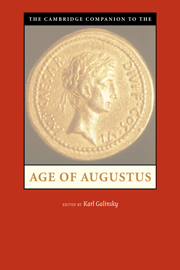Book contents
- Frontmatter
- Introduction
- Part I Political History
- Part II Intellectual and Social Developments
- 3 Mutatas Formas: The Augustan Transformation of Roman Knowledge
- 4 Romans in the Roman World
- 5 Provincial Perspectives
- 6 Women in the Time of Augustus
- Part III The Emperor's Impact
- Part IV Art and the City
- Part V Augustan Literature
- Part VI Epilogue as Prologue
- Select Bibliography and Works Cited
- Index
5 - Provincial Perspectives
from Part II - Intellectual and Social Developments
Published online by Cambridge University Press: 28 March 2007
- Frontmatter
- Introduction
- Part I Political History
- Part II Intellectual and Social Developments
- 3 Mutatas Formas: The Augustan Transformation of Roman Knowledge
- 4 Romans in the Roman World
- 5 Provincial Perspectives
- 6 Women in the Time of Augustus
- Part III The Emperor's Impact
- Part IV Art and the City
- Part V Augustan Literature
- Part VI Epilogue as Prologue
- Select Bibliography and Works Cited
- Index
Summary
Writing the Provinces into a very Roman Revolution
Augustus and the City of Rome stand at the heart of all histories of this period. Augustus and his image builders put them there. The contributions made by others were limited in fact, and effaced from memory unless they could be grouped around the person of the emperor. The other great cities of the Mediterranean - Athens and Alexandria above all - were plundered and marginalised. Augustus wrote his name all over the City and transported the City out to the world. His Res Gestae et Impensae lists wars won abroad and money spent at home, that is in Rome. Most modern accounts have followed this steer in stressing the complexity and importance of the accommodation that Octavian/Augustus achieved with the senatorial and equestrian élites of the City and of Italy (Syme 1939, Eck 2003). Others have explored how he constructed the new order - symbolic, political, religious, moral, military, and economic - out of the traditional symbols, words, rituals, spaces, and institutions of Republican Rome (Galinsky 1996, Nicolet 1991, Zanker 1988). We slip, in our usage, easily from Rome the City to Rome the Empire and back again. Urbs obscures Orbis.
Yet Roman history in the lifetime of Augustus is no longer the history of one city. Well before Actium the Roman People, so prominent in Augustan writing, referred to a citizen body that incorporated virtually all the free inhabitants of the Italian peninsula and many beyond it (cf. Purcell, previous chapter in this volume).
- Type
- Chapter
- Information
- The Cambridge Companion to the Age of Augustus , pp. 106 - 129Publisher: Cambridge University PressPrint publication year: 2005
- 5
- Cited by

